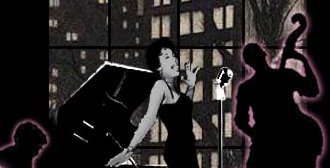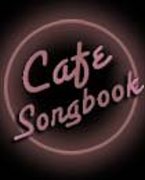Welcome toCafe SongbookInternet Home of the |
 |
 |
| Home || Songs || Songwriters || Performers || Articles and Blogs || Glossary || About Cafe Songbook || Contact/Submit Comment | |
| Search Tips: 1) Click "Find on This Page" button to activate page search box. 2) When searching for a name (e.g. a songwriter), enter last name only. 3) When searching for a song title on the catalog page, omit an initial "The" or "A". 4) more search tips. | |
What Is a Standard? |
DVD box set includes
|
The core of The Great American Songbook (but by no means its entirety*) is a group of songs, each of which is generally called a "standard" -- a term difficult to define. An example of the difficulty lies, by analogy, in the problem Supreme Court Justice Potter Stewart encountered when, in 1964, he was struggling to put into words a definition of the term "obscenity." He emphasized his frustration with finding the right words when he famously declared, "I know it when I see it!" Giving exact words to the meaning of "standard" as it applies to a popular song is similarly elusive in that when we hear Cole Porter's "Night and Day," or Rodgers' and Hart's "Where or When," or Irving Berlin's "Blue Skies," or Harold Arlen's and E. Y. Harburg's "Over the Rainbow," we may not know exactly why it's a standard, but when we hear it, we know it is one. Definitions of "standard" are, nevertheless, not that hard to find, though they are often different from one another. Wilfred Sheed is his book The House That George Built writes that by a standard he means a song that fifty years after it was written "is still popular enough for most cocktail lounge pianists to have a rough idea of [how to play it] and for their copyrights still to be worth fighting for." An ironic problem associated with Sheed's first requirement is that standard songs have outlasted, pretty much, the existence of coctail lounge pianists themselves, which have faded away with an era, even though the songs they sang remain.) Similarly Max Morath called a standard "a song whose words and music every professional musician is supposed to know." Stephen Holden, music and film critic for The New York Times, inclines toward the psycho-social notion that a standard is a song "deeply embedded in the American psyche." For our purposes, this last factor is key, but by itself insufficient. It is possible to specify quite a few of the qualities that have enabled these songs to become permanent fixtures of American popular music culture: A Great American Songbook standard is a song that 1) derived from a specific period in American history -- c.1920-1960; 2) was created within a specific tradition of American songwriting, a tradition the foundation of which is the crafting of popular songs by professional composers and lyricists, among whom are a core group whose names are virtually synonymous with the idea of a standard: Irving Berlin, Jerome Kern, George and Ira Gershwin, Cole Porter, Rogers and Hart, et. al.; 3) was written with the intention that it be sung and played by professional singers and musicians on the Broadway stage, or in a Hollywood movie, or by the purchasers of sheet music published, most likely, on Tin Pan Alley; 4) survived the generation by which it was created by having been taken up (performed and recorded), perpetually it would seem, by singers and instrumentalists of succeeding generations; 5) often, though not always, has a lyric that expresses a modern American sensibility -- meaning the American sensibility of the first half of the twentieth century, a sensibility more often than not invested with urbane wit, sophisticated irony, language that at one moment is highbrow and at the next right off the street, and quite often expressing a degree of ambivalence and uncertainty toward love and life ("This can't be love because I feel so well"; 6) has a melody you cannot only whistle but can't forget; 7) and as a package of words and music is capable of touching the most fundamental of human emotions: love, loss and occasionally qualified joy ("Forget your troubles / Come on get happy."). The quality of apparent musical and cultural immortality is, perhaps, the standard's most distinguishing characteristic. Before a song qualifies as a standard it must pass the test of time. Many songs that were hits during the standards era have disappeared into musical and cultural oblivion. A standard, however, defies oblivion. Moreover, the standard song has managed to live on through later periods of popular music even though audiences who have come of age during these subsequent times have more than enthusiastically embraced the new genres of popular music. Standard songs have even survived the advent of Rock and Roll, which signaled, in the mid-1950's, the end of standard type songs as mainstream popular music. Perhaps the most significant factor not listed above but crucial to the continuing life of American standard songs is the special relationship that has developed between standards and jazz, a topic that will be taken up in detail in a future article. For now suffice it to say that jazz musicians and singers (performers of the only truly American musical genre) have found in Songbook standards a rich vein of melody and/or chord structure on which to improvise making them into jazz (or jazz inflected) works; and when played and/or sung (and recorded) often enough by jazz musicians and singers established for these songs a place within the jazz repertoire along with original jazz compositions. This symbiosis has been crucial both for jazz and for standard songs generally enabling both to live on more vitally and fully as parts of American musical life than they would have othewise been able to do. |
| back to top of page | |
Reference Sources and Further Reading for"What Is A Standard?" |
|
|
This section is currently in preparation. |
| back to top of page | |
Visitor CommentsSubmit comments on songs, songwriters, performers, etc.
Feel free to suggest an addition or correction. Please read our Comments Guidelines before making a submission. (Posting of comments is subject to the guidelines. Not all comments will be posted.) |
| To submit a comment, click here. |
Posted Comments on "What Is a Standard?" May 12, 2014: "Neuman" advises, "Yip Harburg wrote the lyrics of 'Over the Rainbow' (not Johnny Mercer)."
|
| back to top of page |
Credits(this page) |
Credits for Videomakers of videos used on this page:
Borrowed material (text): The sources of all quoted and paraphrased text are cited. Such content is used under the rules of fair use to further the educational objectives of CafeSongbook.com. CafeSongbook.com makes no claims to rights of any kind in this content or the sources from which it comes.
Borrowed material (images): Images of CD, DVD, book and similar product covers are used courtesy of either Amazon.com
Any other images that appear on CafeSongbook.com pages are either in the public domain or appear through the specific permission of their owners. Such permission will be acknowledged in this space on the page where the image is used.
For further information on Cafe Songbook policies with regard to the above matters, see our "About Cafe Songbook" page (link at top and bottom of every page). |
Page Menu |
| What Is A Standard? |
| Further Reading |
| Visitor Comments |
| Credits |
| Home || Songs || Songwriters || Performers || Articles and Blogs || Glossary || About Cafe Songbook || Contact/Submit Comment | |
© 2009-2018 by CafeSongbook.com -- All Rights Reserved |






